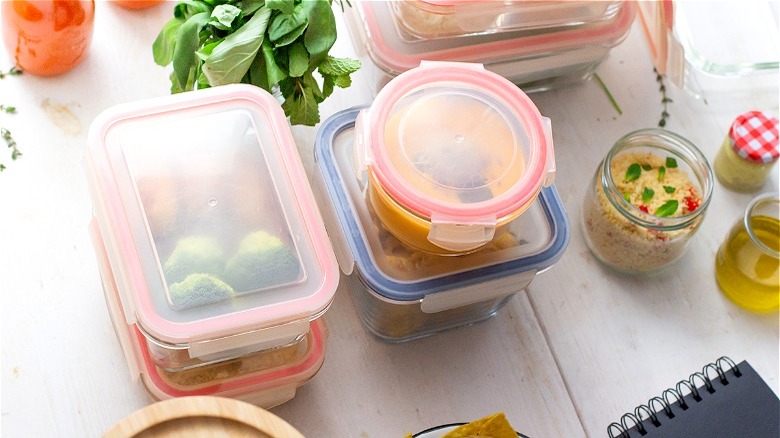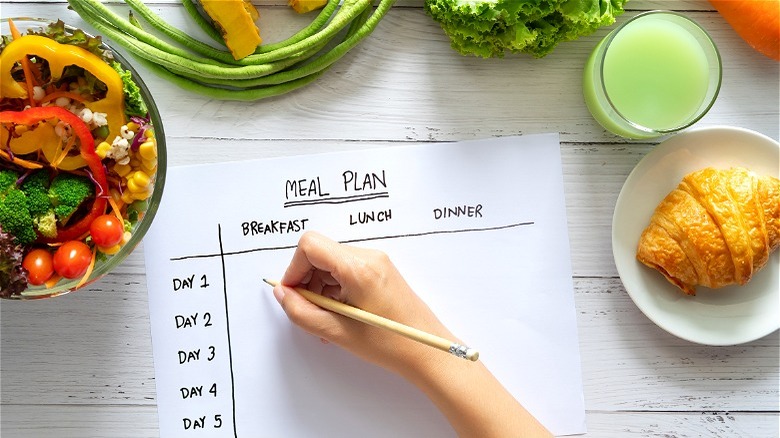The Key To Saving Time And Effort At The Grocery Store? Doubling Recipes
Regardless of how much you like or dislike food shopping, going to the grocery store is often a necessary task. One 2021 survey conducted by Spryker on the precedence of online food shopping found that more than 40% of Americans dislike grocery shopping. Yet, according to Statista, Americans are still taking 1.6 grocery trips per week, likely attributed to the fact that consumers still enjoy picking and choosing their food. Even if you do find food shopping somewhat enjoyable, there are certain elements surrounding the grocery shopping experience that can make those weekly trips more stressful than they have to be.
Most of us can attest to the fact that food has increasingly become more expensive over the years. Beyond your contentment with choosing grocery items that are worth the splurge, the reality remains that most of the everyday foods we deem necessary now have higher price tags due to inflation and a number of other external factors.
While many Americans have changed their shopping habits as of late to cope with high prices such as buying less meat and visiting multiple stores for the best deals, there's another efficient way you can stretch your time and funds even further.
Batch cooking may save time and energy in the kitchen
If you're someone who enjoys cooking, you can attest to the high price of following certain recipes. Of course, there are specific ways to break poor shopping habits, such as limiting your supermarket visits and being more mindful of food waste. But beyond your attempts to be more practical, you'll still probably be left with residual ingredients from making that pasta bolognese recipe. To stretch your weekly groceries, consider batch cooking to use up those costly ingredients. Not only will you have less food waste in the long run, but you'll also be one step ahead by prepping additional meals for a later date.
Most ingredients we buy at the grocery store tend to be purchased in bulk. So one surefire way consumers are working to use up those precious extras is by making more meals. You'll save money by making more at once. Better yet, you'll have additional time later in the week to relax.
However, there are some things to keep in mind when doubling a recipe. You'll want to make sure your pots and pans can handle more ingredients ahead of time, and you should always pay extra attention to cooking time, as more ingredients potentially means added time in the oven.
Additional ways to save time and money at the grocery store
In addition to making extra meals to freeze for a later date, there are plenty of money-saving grocery store hacks worth following. First, meal planning is a solid way to keep your weekly food costs low; it also aids you in making healthier food choices. Food shopping when the store is less busy will also keep you from getting flustered and allow you to make smarter choices. You'll also spend less time food shopping if you go during times with the least amount of foot traffic, such as the early morning or before the pre-dinner rush.
While doubling recipes is a convenient way to save money, some people don't enjoy eating the same meals over and over again. To avoid this problem, you can still buy certain foods in bulk. Instead of making more of the same dish simply repurpose those basic ingredients to make different meals. If the creative juices aren't flowing, just freeze any cooked vegetables or protein to use at a later date.
U.S. News & World Report outlines the most cost-saving foods to keep on hand if you're trying to save money. This basic list includes versatile ingredients such as frozen fruits and vegetables, pasta, eggs, and potatoes. If you're trying to make the most of your precious time and energy, keep things simple. By shopping smart and aiming to buy versatile ingredients, you can stretch your weekly food haul successfully — and with minimal effort.


